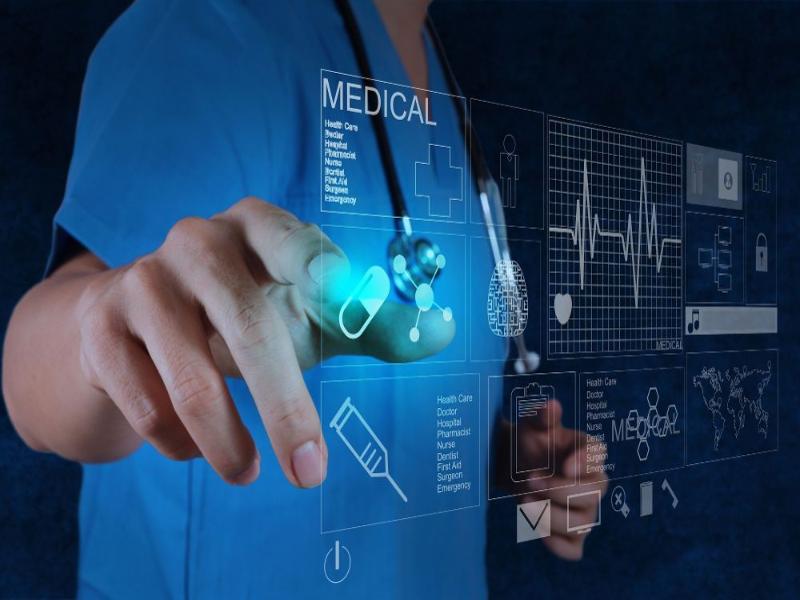Healthcare Tech Innovations
Did you know that healthcare tech innovations are revolutionizing the way patients receive care?
With innovative healthcare solutions and the ongoing digital transformation in healthcare, patients are experiencing improved outcomes and enhanced medical services like never before.
Healthcare Tech Innovations
In today’s rapidly advancing world, healthcare technology trends are transforming the industry like never before.
Cutting-edge healthcare technology is paving the way for innovative solutions that enhance patient care, improve outcomes, and optimize medical processes.
The following are some of the key trends shaping the future of healthcare technology:
1. Artificial Intelligence (AI)
AI is revolutionizing healthcare by enabling advanced data analytics, predictive modeling, and personalized medicine.
Machine learning algorithms are being used to analyze vast amounts of medical data, leading to more accurate diagnoses and treatment plans.
2. Internet of Medical Things (IoMT)
The IoMT refers to the interconnectivity of medical devices and healthcare systems through the Internet. It is one of those healthcare tech innovations that allows for real-time monitoring of patient vitals, remote patient care, and improved communication between healthcare providers.
3. Telehealth and Telemedicine
Telehealth and telemedicine technologies have become increasingly popular, especially in the wake of the COVID-19 pandemic.
These solutions enable virtual consultations, remote diagnosis, and online medical services, improving access to healthcare for patients in remote areas and reducing the burden on traditional healthcare systems.
4. Big Data Analytics
Big data analytics plays a crucial role in extracting meaningful insights from vast amounts of healthcare data.
12 Best Apps for Data Analysis
By analyzing patient health records, treatment outcomes, and population health trends, healthcare providers can make informed decisions, enhance preventive care strategies, and improve public health initiatives.
5. Blockchain Technology
Blockchain technology ensures the secure and transparent exchange of healthcare data.
Through decentralized networks, patient records, medical research, and billing processes can be streamlined, reducing the potential for errors and enhancing data privacy.
| Trend | Description |
|---|---|
| Artificial Intelligence (AI) | Revolutionizing healthcare with advanced data analytics, predictive modeling, and personalized medicine. |
| Internet of Medical Things (IoMT) | Enabling real-time monitoring of patient vitals, remote patient care, and improved communication between healthcare providers. |
| Telehealth and Telemedicine | Facilitating virtual consultations, remote diagnosis, and online medical services to improve access to healthcare. |
| Big Data Analytics | Extracting insights from vast amounts of healthcare data to enhance decision-making and improve public health strategies. |
| Blockchain Technology | Ensuring secure and transparent exchange of healthcare data, streamlining processes and enhancing data privacy. |
Digital Transformation in Healthcare
Digital transformation in healthcare is revolutionizing the way patient care is delivered. Thanks to advancements in healthcare technology, patients now have access to improved medical services and personalized care.
Electronic health records (EHRs) and remote monitoring systems are just a few examples of how digital transformation is shaping the healthcare industry.
Electronic Health Records (EHRs)
One of the key advancements in digital transformation is the adoption of electronic health records (EHRs).
EHRs enable healthcare providers to securely store and share patient information electronically, improving the accuracy and efficiency of healthcare delivery.
With EHRs, medical professionals can access patients’ medical history, medications, and test results with just a few clicks, eliminating the need for manual paperwork and reducing the risk of errors.
Remote Monitoring Systems
Another significant advancement in digital transformation is the development of remote monitoring systems.
These systems allow healthcare providers to remotely monitor patients’ vital signs, chronic conditions, and other health parameters from the comfort of their own homes.
This technology not only improves patient convenience but also enables early detection of potential health issues and timely intervention, enhancing overall patient outcomes.
While digital transformation brings numerous benefits to healthcare, it also presents challenges that need to be addressed.
One of the key challenges is ensuring data privacy and security. With the increased reliance on electronic health records and remote monitoring systems, healthcare organizations must implement robust cybersecurity measures to protect sensitive patient information.
Overall, digital transformation in healthcare is driving significant advancements in patient care. By harnessing the power of healthcare technology, healthcare providers can deliver more personalized and efficient services.
Electronic health records and remote monitoring systems are just the beginning of a transformative journey that has the potential to revolutionize the healthcare industry.
AI in Healthcare
AI has played an essential role in healthcare tech innovations. The use of artificial intelligence (AI) in healthcare has revolutionized the industry, enhancing patient care and driving healthcare technology advancements.
AI technology is being implemented in various aspects of healthcare, including diagnostics, predictive analytics, and personalized medicine.
In the field of diagnostics, AI algorithms are capable of analyzing vast amounts of medical data with incredible accuracy, assisting healthcare professionals in making more precise and timely diagnoses.
This not only improves patient outcomes but also helps to alleviate the strain on healthcare systems.
Transforming Predictive Analytics
AI is also transforming predictive analytics in healthcare. By analyzing patient data and patterns, AI algorithms can identify individuals at risk of developing certain conditions or experiencing adverse health events.
This early detection enables healthcare providers to intervene proactively, improving patient outcomes and reducing healthcare costs.
Moreover, AI-driven predictive analytics can assist with resource allocation and capacity planning, ensuring that healthcare facilities are equipped to meet the needs of their patient populations efficiently.
Personalized Medicine
AI technology is playing a crucial role in the advancement of personalized medicine. By analyzing an individual’s unique genetic makeup and combining it with other relevant data, AI algorithms can provide tailored treatment plans and medication recommendations.
This personalized approach improves treatment effectiveness, minimizes adverse reactions, and enhances patient satisfaction.
However, while the integration of AI in healthcare offers numerous benefits, it also raises important ethical considerations.
Ensuring data privacy and maintaining transparency in algorithm decision-making are crucial factors to address to build trust and ensure equitable access to AI-enabled healthcare.
| Benefits of AI in Healthcare | Ethical Considerations |
|---|---|
| Improved diagnostic accuracy Enhanced predictive analytics Personalized treatment plans Efficient resource allocation | Data privacy and security Algorithm bias and transparency Equitable access to AI-enabled healthcare |
Telemedicine Technology
In today’s rapidly evolving healthcare landscape, telemedicine technology is revolutionizing how medical services are delivered.
As part of the ongoing digital transformation in healthcare, telemedicine offers numerous benefits that enhance patient experiences and access to care.
One of the key advantages of telemedicine technology is its ability to improve access to healthcare services, especially for individuals in remote or underserved areas.
Through virtual consultations, patients can connect with healthcare professionals regardless of their geographical location, eliminating the need for travel and reducing barriers to receiving timely care.
Telemedicine also addresses the issue of long wait times and overcrowded healthcare facilities.
By leveraging digital platforms, healthcare providers can efficiently manage patient appointments and consultations, ensuring that individuals receive timely care without unnecessary delays.
This streamlined process not only improves the patient experience but also increases overall efficiency in healthcare delivery.
How Accurate is Fitbit Calories Burned
Furthermore, telemedicine technology offers cost savings for both patients and healthcare organizations. Virtual consultations eliminate the need for physical office visits, reducing transportation costs and potentially lowering healthcare expenses.
Remote monitoring systems and telehealth platforms also enable early intervention and preventive care, leading to better health outcomes and potentially reducing the need for costly hospitalizations.
Examples of telemedicine platforms include Teladoc Health, Amwell, and Doctor On Demand. These platforms provide patients with convenient access to qualified healthcare professionals through secure video consultations and remote monitoring solutions.
Patients can seek medical advice, receive diagnoses, and even obtain prescriptions from the comfort of their own homes.
The Impact on Patient Experiences
Telemedicine technology significantly impacts patient experiences by providing convenience, accessibility, and personalized care.
Patients can avoid the inconvenience and time constraints associated with traditional in-person visits, allowing them to receive medical guidance and support when they need it most.
For individuals with chronic conditions or those who require regular follow-up appointments, telemedicine offers a seamless and effective way to manage their healthcare.
Through remote monitoring devices, patients can transmit vital signs and health data to their healthcare providers, facilitating ongoing care and enabling timely adjustments to treatment plans.
Moreover, telemedicine technology empowers patients to take a more active role in their healthcare journey.
With easy access to medical information, personalized treatment plans, and the ability to communicate with healthcare professionals, patients can make informed decisions about their health and actively participate in their care.
In conclusion, telemedicine technology is playing a crucial role in transforming healthcare delivery.
By leveraging digital platforms and virtual consultations, telemedicine enhances access to care, improves patient experiences, and brings about cost savings for both patients and healthcare organizations.
As the digital transformation in healthcare continues, telemedicine is poised to become an integral part of the healthcare system, ensuring that patients receive quality care conveniently and efficiently.
Conclusion
Throughout this guide, we have explored the various facets of healthcare tech innovations and their impact on improving patient experiences.
The healthcare industry is constantly evolving, driven by innovative solutions and cutting-edge technology.
From the latest healthcare technology trends to the digital transformation in healthcare, we have witnessed how advancements in technology have revolutionized patient care.
Electronic health records and remote monitoring systems have streamlined medical services, leading to better healthcare outcomes.
Healthcare technology startups and AI in healthcare have also played a crucial role in driving innovation.
These startups bring fresh perspectives to the industry and have the potential to transform patient care. The use of AI in areas like diagnostics and predictive analytics has revolutionized personalized medicine.
Furthermore, telemedicine technology has emerged as a game-changer in healthcare delivery. By leveraging telecommunication tools, patients can access healthcare services remotely, ensuring improved access to care and cost savings.
In conclusion, healthcare tech innovations have paved the way for innovative healthcare solutions. With the digital transformation in healthcare, we are witnessing a new era of patient-centered care.
15 Best Data Transformation Tools You Need Now!
From healthcare technology startups to AI-driven advancements and telemedicine technology, the future of healthcare looks promising with the potential for enhanced patient experiences and improved health outcomes.







